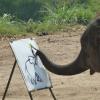As I have been getting into arguments it seems wise to open a thread, even a poll. The argument is pretty much in the thread title. I have spent many posts argumenting it in various ways in different threads, I'll quote here one that sums it up nicely.
Reproduction is also means of mutation. And mutation is a "necessity of evolution" therefore quite probably modulated by a detection of necessity to evolve(death drive). Therefore, reproduction is subject to both life drive and death drive except one favors low mutation and the other high mutation.
Evolution EVOLVED "programmed death" as strategy in order to provide, among other things, a "time frame" for organisms to "prove their worthyness". Each life lived provides evolution a clue about how to evolve or not evolve further. Each life lived is a testimony to the success of its form(genetic arrangement) and its knowledge(relation to reality learned from parents/group/self-experience) in relation to the conditions available at the time. Obviously it seems quite smart to evolve mechanisms that recognize "worthyness" in advance, before the final verdict to speed up the process of evolution(which is a competition).
Organisms actively measure their success against the "life and death urges and instincts crafted by evolution into their bodies" during their lifetime and this measurement, this state, is used to process life and death drive of the organism at various levels - including migration, maturing and aging. Most interestingly I would postulate that certain if not most life forms do have a death drive mechanism that also increases mutation during replication. When analysing evolution from an abstract standpoint and trying to lay out evolution principles it seems quite logical that a mechanism for increasing and decreasing mutations would evolve and feed off other life/death mechanisms and that it would work in tandem with aging and maturing.
Life and death drive are in balance. Facilitated mostly by mu-opioid and kappa-opioid receptors, they provide "tolerance" to drugs and to the world itself. Acquired control is an increase in "life force", a measure of "life drive". Kappa opioids upregulate immediately to provide counterbalance. This causes a "shadow fear" of loss of control of that which is already controlled and this shadow fear is part of the "death drive". This is simply reacting to the derivation(change) of well being as a predictor of wrongs Tolerance/upregulation is crafted by evolution in order to preempt negative changes in the environment. The organism is not allowed to lose control of that which it already has control. It fights to keep this control and this is provided by "death drive". You see, evolution crafted the organism to start acting according to "death drive" as soon as "things start going downhill". Evolution doesn't wait around for time and death to resolve things - it evolved higher order functions to predict this - if the organism that can't keep control it will have lesser chance to survive and thrive. It must make behavioral changes immediately in order to keep up with other evolving organisms - it can not wait for death to show that it wasn't worthy. Thus mammals adapt faster by being able to modify their subconscious behavior through conscious experience of its success and vmPFC mammals are able to adapt even faster by an ability modulate conscious behavior with their "wisdom".
Main life/death mechanism in guessed order of evolution are
* feeding - all
* swarming - a lot of unconscious life
* sexual reproduction( including migration to special places of reproduction) evolved in unconscious life(pre reptilians)
* group domination modulated by power - reptilian - subconscious
* group domination evolved to be modulated by seniority(knowledge) - evolving cooperation and transfer of knowledge and
offspring nurture - mammalian - conscious
* group domination evolved to be modulated by awareness of wisdom and possession - evolving social structure - great apes and humans.
Obviously, the later evolved life takes a penalty from aging too fast because it causes the accumulation of knowledge and wisdom to be shortlived and useless.
A human has all the above "mechanisms" of life and death drive installed(and probaly a few more, other especially simple life evolved differing strategies) and in balance with each other with the top being the most recently evolved awareness or vmPFC.
But for simple life, the death/reproduction is the main regulator of adaptation. They are not capable of "mid-lfe" behavior adaptation(learning), they must reproduce to mutate in order to change behavior, in order to adapt.
A mammal needs to start agings or else the offspring will not be able to reproduce as the older mammal owns women being more wise, knowledgable, having more possesions and therefore being more dominant. So evolution stops as the older immortal mammal can not be beaten by the sheer advantage of his evergrowing strength and knowledge.
If there is an inbuilt "penalty"(aging) the older mammal will be worn down sooner or later. If it happens sooner, the offspring will start to reproduce earlier and spread his genes more. If it happens later the older mammal will produce more of his offsprings. Its a balance that "directs" evolution based on during-life experience.
The ability to emotionaly(consciously) experience our actions evolved in mammals to support "mid-life" adaptation of inbuilt behavior schemas. Reptiles can not hunt, they can not learn tricks, they can not learn how an animal will run from them, they can not be tamed. They have their instinctual strike range and as all preconscious life base their hunt on camouflage and instictual striking and conditioned place preference systems and some simple homing/guiding mechanisms that do not support learning but simply instinctually cause inbuilt and unchangeable behavior. Premammalian life has to use death to perform natural selection in order to evolve their behavior schemas.
Mammals can evolve their knowledge/behavior during their life time. They can perform a behavior, and it if works it is good, if it doesnt it is bad - so a natural selection of behavior can be performed and the result must be remembered and experienced in order to produce extinction or reinforcement of behavior. And they can pass on these learned behaviors. These "drives" are rewarded by "good feelings" or "bad feelings' when they fail(behavior proves to be fruitless resulting in frustration which can be rescued by delta opioid agonists - if frustration is not rescued it creates an learned avoidance/fear paradigm through kappa opioid receptors in order to avoid the disappointing/frustrating behavior in the future. successive negative contrast - look it up, only mammals have it). Evolution of knowledge is pitted against the need for knowledge of the group resulting from their more basic needs, which they express/communicate. The group in an emotional way rewards the evolver of knowledge - therein lies inherent motivation. They feel happy to serve the one who offers them knowledge-lifeforce that helps them and thus proving seniority to be the domination hierarchy rather then sheer power as in reptiles.
As you can see, aging/death/reproduction was the only mechanism to modulate "evolution speed".
In mammals and later, learning and unlearning of behavior allowed the evolution speed(as in adaptation of behaviour, not just genes) to increase but this system must have evolved from or "on top" of the older "evolution speed" systems that regulate aging/death.
Aging should rather be called "maturing" to make matters more clear.
------
So, what do you think? Please vote and give your argument
Thank you.
Edited by addx, 27 March 2014 - 09:15 PM.



















































